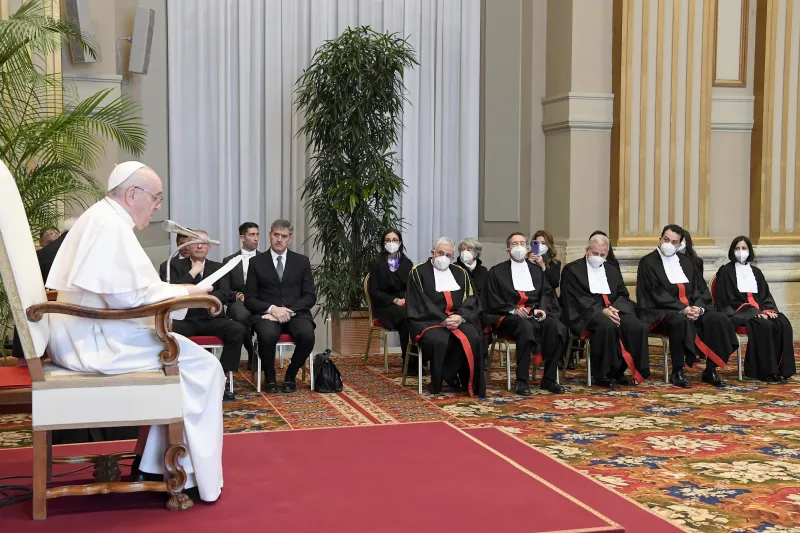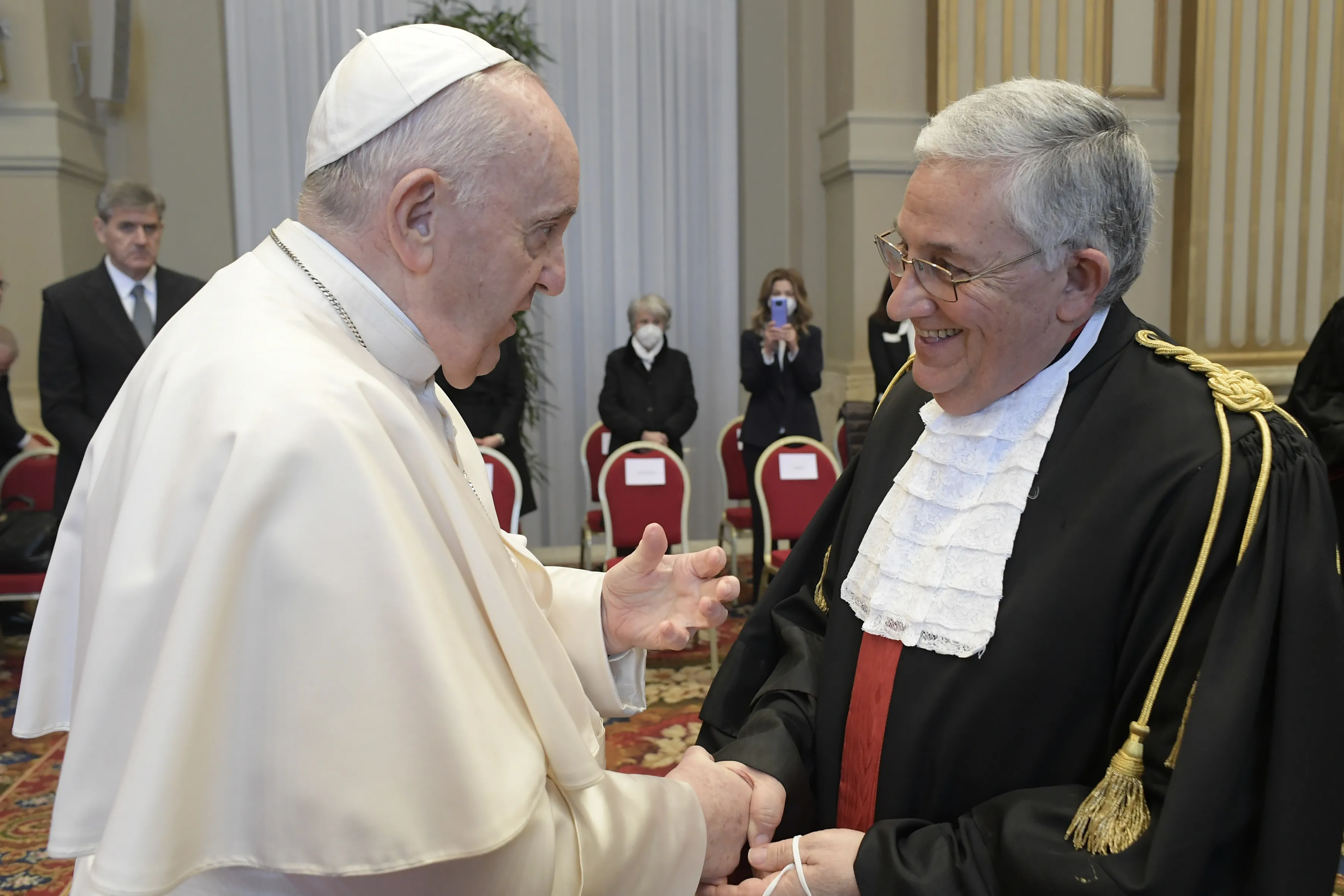
Vatican City, Mar 12, 2022 / 08:00 am (CNA).
On the eve of the Vatican’s trial of Cardinal Angelo Becciu for fraud, Pope Francis spoke to the city state’s court system about the importance of working together and listening to everyone to ensure a fair process.
Synodality in judicial matters, the pope said on March 12, “means that all the participants in the process … are called to contribute to the ascertainment of the truth through the adversarial process, the confrontation of arguments and the careful examination of evidence.”
“This walking together therefore requires an exercise in listening, which, as we know, belongs to the very nature of a fair trial,” he added.
Becciu, who was forced to resign from the rights of members of the College of Cardinals in September 2020, has been charged with embezzlement, abuse of office, and subornation of perjury.
The 74-year-old Italian cardinal has consistently denied wrongdoing. He is due to take the witness stand next week as one of 10 defendants in a Vatican trial over the Secretariat of State’s purchase of a luxury London property.
At the opening ceremony for the judicial year of the Vatican City State’s courts on Saturday, Pope Francis said judges must exercise honest listening “without prejudice or preconceived notions.”
“With the same willingness to listen, which requires time and patience, each member of the judicial panel must be open to the reasons presented by the other members, in order to arrive at a considered and shared judgment. Listen to everyone,” he stated.
He thanked by name the Vatican’s chief judge and its head prosecutor, who are both working on the Becciu trial and have been disputing behind the scenes.
I thank, he said, President of the Tribunal Giuseppe Pignatone and Promoter of Justice Gian Piero Milano “for the dedication with which they engage in the delicate service of the administration of justice.”

Pope Francis said the work of the Vatican City magistrates “is destined to increase in a season of reform,” mentioning innovations in the economic, financial, and judicial spheres.
“Reforms,” he explained, “that intend to correspond on the one hand, to the parameters developed by the international community in various areas, such as the economic field, and, on the other hand, to the Church’s own need to adapt all its structures to an increasingly evangelical style.”
He said provisions have been made to restrain expenditure and to strengthen the Vatican’s transparency in the management of public finances, “which, in a context such as the Church, must be exemplary and irreproachable, especially on the part of those who hold important positions of responsibility.”
Referencing St. John Paul II’s speech for the presentation of the new Code of Canon Law in 1983, Pope Francis said “in serving the cause of justice, law must always be inspired by the law-commandment of charity.”
“From this point of view, which excludes any self-referential vision of the law,” he continued, “the justice proposed by Jesus Christ is not so much a set of rules to be applied with technical expertise, but rather a disposition of life that guides those who have responsibility and that demands above all a commitment to personal conversion.”
“It calls for a disposition of heart to be implored and nourished in prayer and thanks to which we can fulfill our duties by combining the correctness of the laws with mercy, which is not the suspension of justice but its fulfillment (cf. Rom 13:8-10).”
About criminal trials, Francis said “justice must always be combined with the demands of mercy, which ultimately call for conversion and forgiveness.”
“Between these two poles there is a complementarity, and a balance must be sought,” he stated.
If you value the news and views Catholic World Report provides, please consider donating to support our efforts. Your contribution will help us continue to make CWR available to all readers worldwide for free, without a subscription. Thank you for your generosity!
Click here for more information on donating to CWR. Click here to sign up for our newsletter.





Just not quite sure, here, what “synodality [?] in judicial matters” is meant to imply…. (The unity of irreducible charity with equally irreducible justice?) We then read: “Referencing St. John Paul II’s speech for the presentation of the new Code of Canon Law in 1983, Pope Francis said ‘in serving the cause of justice, law must always be inspired by the law-commandment of charity.’”
FIRST, this, from St. John Paul II’s speech (on the new code of Canon Law, and addressed to 100 archbishops, bishops and priests taking a course at the Pontifical Gregorian University, November 21, 1983):
“Paul VI rightly emphasized that the law of the Church is different from that of the state. In fact, it is a LAW OF GRACE [italics], if it is a LAW OF COMMUNION [italics]. I like to cite Paul VI because he was for canonists a master of thought, a theologian of law. He desired that theological science and canonical science be reunited once again in the contemplation of the unique mystery of the Church; in order to investigate more thoroughly in a vision of order and peace what the love of God and men in Jesus Christ is meant to be, in full submission to the Spirit, who leads to the whole truth and directs the Church through those whom He wanted in the apostolic succession as judges of the faith [!] ; teachers of truth [!] and pastors of charity [!]: Iudices fidei, doctors Veritatis, pastores caritatis.”
SECOND, and for example, regarding the sacrament of marriage (and Amoris Laetitia?), this from St. John Paul II’s discourse delivered to judges, officials and advocates of the court of the Sacred Roman Rota (January 26, 1984):
“It is here that the impartiality and the wisdom of the ecclesiastic judge must shine: to KNOW [italics] the law well, by penetrating its spirit in order to be able to apply it; to STUDY [italics] the auxiliary sciences, which allow a more thorough knowledge of the facts and, above all, of persons; and finally, to be able to FIND THE BALANCE [italics] between the inescapable duty [!] to defend the indissolubility of marriage [!] and the due attention to the complex human reality of the concrete case.”
This papacy has appeared to turn into a pharisaical comedic disaster…. Pachamama is alive & well in the halls of the vatican…